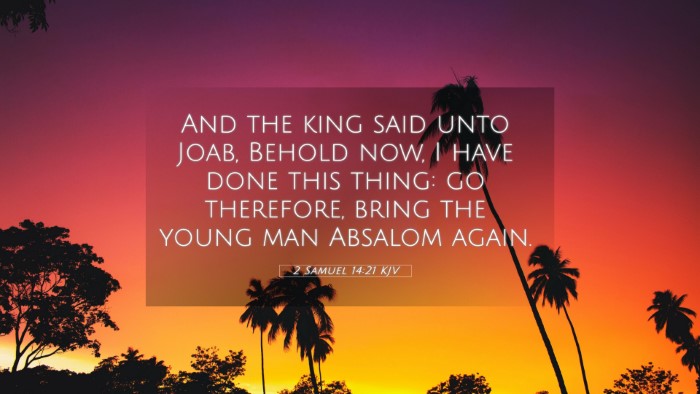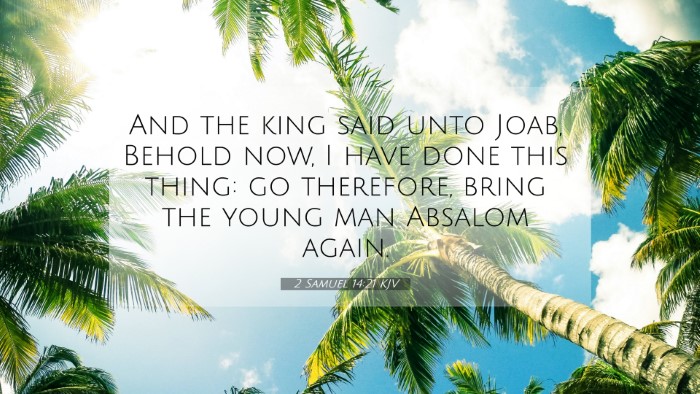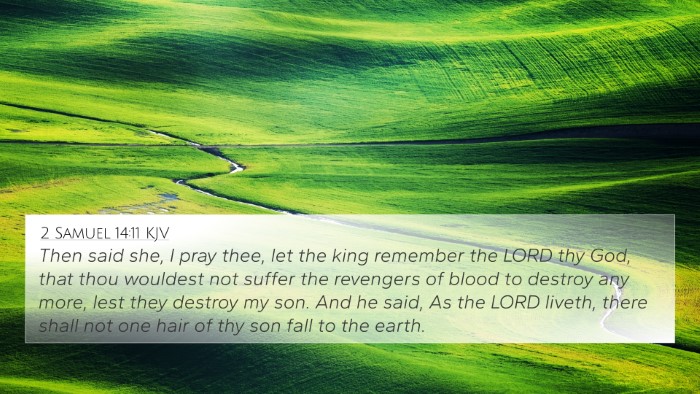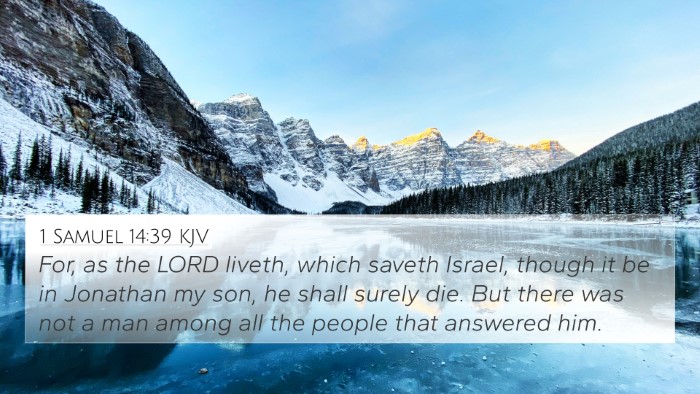Understanding 2 Samuel 14:21
Bible Verse: 2 Samuel 14:21 - "And the king said, 'Is not the hand of Joab with thee in all this?' And the woman answered and said, 'As thy soul liveth, my lord the king, none can turn to the right hand or to the left from ought that my lord the king hath spoken: for thy servant Joab, he bade me, and he put all these words in the mouth of thy handmaid.'
Verse Context
This verse is part of a narrative involving King David and a wise woman from Tekoa whom Joab sent to persuade the king to reconcile with his estranged son Absalom. Joab, recognizing David’s sorrow over Absalom’s exile, orchestrates this encounter to influence David’s decision.
Commentary Insights
This verse can be understood better with insights from various commentaries:
-
Matthew Henry:
Henry emphasizes Joab’s cunning in using the woman’s speech to draw David out of his despondency, highlighting the reliance on human wisdom instead of divine guidance. Joab's intervention showcases the complexities of leadership and the necessity for reconciliation within the royal family.
-
Albert Barnes:
Barnes focuses on the implications of the woman's declaration regarding Joab's involvement, suggesting that she speaks on behalf of Joab, illustrating how leaders sometimes rely on intermediaries to convey messages. This indicates the value of mediation in human relationships, especially regarding disputes.
-
Adam Clarke:
Clarke notes the intricate dynamics between David and Joab, indicating a dance of power and persuasion. He highlights the woman’s acknowledgment of Joab's pivotal role, reflecting the theme of human agency in divine plans, as Joab’s maneuverings ultimately seek a restoration of family unity.
Thematic Connections
The themes of reconciliation, human wisdom versus divine will, and the complexity of personal relationships emerge strongly in this verse. It serves as a reminder of the multifaceted nature of leadership and the intricate balance between authority and empathy.
Bible Verse Cross-References
Understanding 2 Samuel 14:21 can be further enriched through cross-referencing other related scriptures:
- 2 Samuel 13:39 - David's longing for Absalom, illustrating his emotional state.
- Proverbs 15:1 - "A soft answer turns away wrath," highlighting the power of words in conflict resolution.
- 1 Samuel 25:32-33 - David’s interactions with Abigail, showcasing the influence of wise counsel.
- Luke 15:20 - The parable of the Prodigal Son, reflecting themes of reconciliation and forgiveness.
- Romans 12:18 - "If it is possible, as much as depends on you, live peaceably with all men," emphasizing the importance of pursuing peace.
- Matthew 5:9 - "Blessed are the peacemakers," connecting the verse's themes to a broader biblical understanding of peace.
- James 3:17 - The wisdom from above, promoting peace and gentleness in relationships, paralleling Joab's and the woman's approach.
Links Between the Themes
Through the lens of the mentioned cross-references, one can see the overarching narrative of reconciliation woven throughout the Bible. From David's personal struggles to the teachings in the New Testament, the consistent call to peace and restoration resonates clearly.
Tools for Bible Cross-Referencing
For anyone looking to dive deeper into the connections between Bible verses, consider using:
- Bible concordances to find relevant passages.
- Cross-reference guides available in study Bibles.
- Online Bible study tools that enable thematic searches.
- Comprehensive Bible reference resources to understand the context better.
Conclusion
In conclusion, 2 Samuel 14:21 serves as a potent reminder of the power of words and the necessity of reconciliatory measures in relationships. By examining this verse alongside other biblical passages, one gains valuable insights into the nature of divine and human wisdom, encouraging a journey of peace and understanding. The exploration of thematic Bible verse connections provides a rich tapestry for deeper spiritual reflection and learning.





